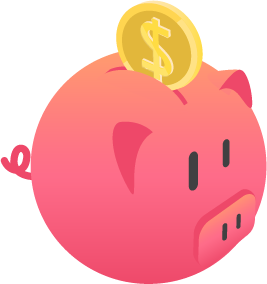 Basic Savings Calculator
Basic Savings Calculator
This calculator makes it easy to figure out how much interest an investor will earn from a one-time deposit, a series of regular deposits, or both. This calculator does not account for inflation or income taxes. If you would like to factor those into your calculation please use this calculator.
Effective Money Saving Tips & Advice for Everyone
Guide published by Joelle Jacinto on December 16, 2019
Saving money can be easier than you think. Start small and make short-term goals.
Before long, your frugal habits will yield more benefits. You won't feel you're tightening your belt as much. Eventually, gaining more income will free you from the stress of financial worries.

To help you out, here are several tips and ideas to save your hard-earned cash.
Why is it hard to save? People are often worried about not having enough money for daily expenses. However, you don't have to put away a lot of money right away to build savings. What matters is you are consistent about saving a designated amount every time you cash in.
How much should you save? It depends on two main factors: How much money you make and how much savings you actually need. To be realistic, set apart the essentials from things that are just nice to have. Once you prioritize what's important, you'll be mindful of where your savings should go.
Next, visualize your cash flow. Create a spreadsheet of your expenses. Calculate your monthly income after taxes and plot it against these two expenditure categories:
- Basic Necessities – mortgage or rent, transportation expenses, food, utility bills, etc.
- Discretionary Expenses – entertainment, travel, and everything else
Make a detailed list of how you spend your money. The basic necessities list is non-negotiable; prioritize this in your budget every month.
If your total expenses exceed your monthly income, reevaluate your discretionary expenses list – what can you buy less or do without? Cut back on minor purchases so you can accumulate more savings.
Managing Your Income
According to most financial advisors, you should apply the 50-30-20 rule when it comes to managing your income:
- 50 percent – Basic Expenses
- 30 percent – Discretionary Income
- 20 percent – Savings

Pigly's Tip!
If, at the moment, 20 percent seems like a long shot, start with 5 percent savings and build your way up to 10 percent. Each time you earn, see to it that you are setting aside a little bit more.
Meanwhile, examine different aspects of your lifestyle and determine how you can save more of your earnings. Here are several changes you can do right now that have a direct impact on your savings:
- Turn off the lights whenever you leave a room. If you live with a big family, make regular rounds to check if light bulbs or other electrical appliances are still on. Unplug devices if you're leaving your house. Apart from saving money, it helps you save energy.
- Eat breakfast. A hearty breakfast makes you crave less food throughout the day, especially if you add protein like eggs or milk to your diet. Having breakfast will make you less likely to splurge on an expensive lunch. Moreover, you'll have more energy throughout the day, which boosts your productivity.
- Make a grocery list and stick to it. Determine the items you need before going to the grocery store. Avoid purchases that are not on your list and be wise about choosing quality products. For instance, if cheap detergent does not clean as well as pricier brands, do not buy it. You are better off using an expensive brand that does the job, rather than a low-quality product that makes you buy more.
- Avoid the mall. Is the mall your go-to place to pass the time? Discover new hobbies instead, preferably things that won't make you spend. Simply walking your dog, hanging out at the park or playing basketball with your buddies are all enjoyable activities. You can also try visiting the local library to check out great books. Only go to the mall when you need something. Scheduling your purchases also limits unnecessary spending. Finally, make sure to buy only what you need.

A Major Lifestyle Change
Living from paycheck to paycheck is unhealthy and stressful, which calls for a lifestyle change.
It is easier to save when you internalize the habit into your daily life. While you need to make sacrifices, do not pressure yourself to turn your life around right away. This can overwhelm you, making your goal seem more difficult and easier to quit. Instead, work slowly toward these changes and you'll find that it is definitely manageable.
Most importantly, you need to change the way you think about saving and spending.
- Visualize your long-term goals. Jot down all your life-long plans. This includes your dreams of traveling, having your own business, or getting married. When you start a family, saving for your child's college education is important. Moreover, don't forget to save funds for a comfortable retirement.
- Factor in your short-term goals. This includes significant expenses that affect your daily living. Do you want new snow tires for your car, or a more efficient washer and dryer? Creating a budget to afford products that make life more convenient is certainly a good way to spend your money. Again, make sure to assess the quality of your purchases.
Actively Manage Your Expenses
When you have concrete goals to look forward to, saving money becomes a force of habit. It become especially motivating once you're gaining more income and reaching your goals little by little.

If you're still getting used to the habit, here are strategies to help you become more mindful about saving:
- Annualize your expenses. Aside from your monthly income and budget, calculate how much you are spending in a year. Examine your weekly and monthly expenses so you have a better idea where your money is going. For example, it might surprise you to learn that buying a large mocha worth $4.75 daily is equivalent to $1,733.75 a year. If you cut back on the coffee, you can grow your savings a bit more.
- Wait a while. Financial advisors recommend giving yourself some time to think before making a purchase. This mentally stabilizes your impulses and helps prevent unnecessary spending. There's a 10-second rule, a 24-hour rule, and a 30-day rule, each suggesting to hold off a purchase. While waiting, ask yourself, “Why am I buying this? Do I really need this?” Choose the one that works best for you.
- Don't reward yourself with retail therapy. Shopping can feel like the best thing ever – until you see your credit card bills. However, if you believe that buying yourself something nice can help motivate you, set a budget on how much you should spend. It's also wise to limit big retail shopping expenses to once or twice a year.
- Put your money where it's safe. Open a separate savings account to effectively track and build your funds. Research on the different types of savings accounts, such as certificates of deposit (CDs), and retirement 401(k)s and IRAs.
- Free yourself from debt. Consolidate all your student loans or apply for a balance transfer credit card. Start paying consumer debt by prioritizing cards with higher interest rates. Paying extra on your credit card bills also get you out of debt faster. You can learn how to manage credit card debt here.
Live a Simpler Life

They say less is more, and in saving money, this is true. If you live in a house but never enter half of the rooms, your house is too big. Moving into a smaller home saves you a lot of money in repairs and maintenance. Your cost of living also goes down when your move into a less expensive neighborhood.
Did You Know?
Downsizing your home and being frugal should not be seen as a lifestyle downgrade. It's more about choosing quality over quantity and getting rid of unnecessary products.
To help you out, here is a list of expenses you can downsize without compromising the kind of life you want.
- Cellphone expenses. Remove services that you don't need. Lower your mobile data subscription if you have access to reliable Wi-Fi. You can also switch to a cheaper network provider.
- Cancel your magazine subscriptions. Unless you're loyal magazine reader, chances are you don't even have time to go through a magazine these days, what with all the free content on the internet.
- Choose generic brands. Consider generic brands over brand-name products the next time you shop. Some manufacturers spend more on marketing products instead of improving their quality. As a result, certain brand-name items are pricey and stylish, but lack quality.
- Dress smart. Go through your closet and make a list of clothes that you actually wear. Mix and match certain garments to come up with fresh-looking outfits. Also, consider donating clothes you haven't worn in a year. You can also have a yard sale for stylish pre-loved pieces.
- Carpool or take public transportation. Climate change is upon us. That said, if you always drive your car, regularly check your tire pressure. The right tire pressure saves a lot of mileage and helps you spend less on gasoline. Moreover, have regular car maintenance to avoid costly major repairs.
Spend Money to Save Money
Investing in home improvement and maintenance can help you save income in the long run. You should factor them into your annual budget to make sure your property is well kept.

Pigly's Tip!
Whether you need heating and cooling repairs, electrical maintenance or roof repairs, make sure to keep tabs on your property's condition. Neglecting home maintenance has dire consequences that can get even more expensive.
Here are several home-maintenance features that are worth your investment:
- Install a programmable thermostat that regulates your home's temperature. It keeps temperatures at comfortable levels throughout the day, especially when it gets cold in the evening. Tip: Turn down your thermostat at night and use a cozy blanket. This helps you save energy and lower your electric bill.
- Replace old appliances with higher quality energy-saving models. You should also use a surge-protector strip which enables users to plug in several appliances at once. That way, if you want to turn off all your plugged devices, you simply turn off one switch.
- Change your traditional light bulbs with LEDs and CFLs (compact fluorescent lamps). CFLs consume 75% less energy and last ten times longer than traditional lighting. On the other hand, LEDs last longer and consume less energy than CFLs.
- Get a tankless water heater. Conventional water heaters continuously consume electricity. A tankless water heater only boils water when you need it.
- Install low-flow showerheads to control your water consumption.
- Replace your toilets with either low-flow, vacuum-assisted, or dual flush toilets to save water.
- Buy a deep freezer so you can store meat in bulk, for a long period of time. You'll also have space for a few weeks' worth of prepared meals.
- Hire a professional for proper home insulation, sealing and weatherstripping. These implements keep your home cool during the summer and warm during wintertime. Efficient property insulation saves you energy and keeps cooling and heating costs down.

Do-It-Yourself
While not everyone has enough the patience to engage in do-it-yourself projects, it is possible to make time for things you actually enjoy.
Once you learn how to do certain activities yourself, you can save some money. Just search online for a wide variety of DIT tutorials. You're likely to find a project that will interest you. Here are a few examples you can try:
- Make your own cleaning supplies – detergent, shampoo, soap, cleaning solutions.
- Make your own beer or wine. It will take a lot of time and research, but it is a worthwhile hobby.
- Start a garden and grow your own vegetables and herbs.
- Make your own lunch. Prepare meals in advance to save time in the morning on the way to work.
- Learn how to cook and expand your culinary expertise. Make your own pasta and bake your own bread.
- Be your own handyman and do your own home repairs.
- Learn to cut your own hair.
- Repair your own clothes instead of throwing them out and having to buy new ones.
- Make gifts. Handmade candles, cookies, dolls and soaps often make thoughtful tokens. People love them because they are personalized items that show you put more effort into giving.
The Bottom Line
Saving extra cash entails some lifestyle changes. While these tips may seem too frugal for other people, it helps to know there are many ways to cut back on expenses.
Once you focus on your financial priorities, it's definitely possible to save more money and build your income.
About The Author
Joelle sees writing as a craft, and is genuinely interested in the topics she tackles, which have ranged from finance and transportation, to pop music, to business advice, to society and culture, to performing arts. She has a Master's in Art Theory and Criticism from the University of the Philippines and is pursuing a PhD in Philippine Socio-Cultural Studies. Her works have been published in broadsheets, lifestyle magazines, online portals and academic journals. Her performing arts reviews have been published in Malaya, Manila Times, Critics Republic, Malaysia, and RealTime Arts, Australia, while her academic work appears in The Borneo Journal and the Journal for the Anthropological Study of Human Movement.
 Basic Savings Calculator
Basic Savings Calculator





